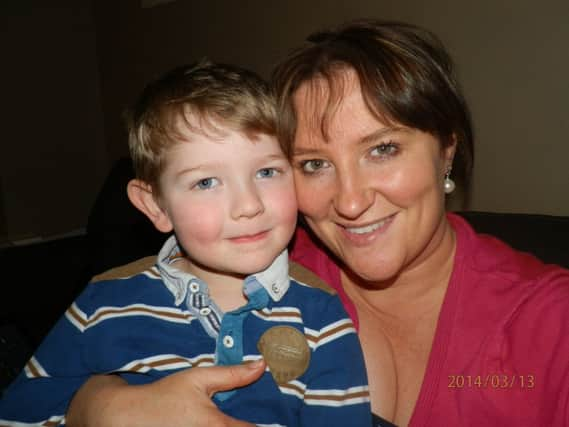Parents’ fast action saved little boy’s life


George Askew was a happy healthy four–year–old boy, living in Matlock with mum, Anne, and dad, Dorrion.
But his parents became concerned in January when he started being thirsty all the time.
Advertisement
Hide AdAdvertisement
Hide Ad“He started drinking excessively and wanting to wee all the time,” Anne explained. “He just seemed irritable and tired and he lost weight.”
Aware of some of the symptoms of diabetes, Anne took George to see his GP.
After carrying out some tests, the doctor found the youngster’s blood sugar levels were sky–high and told Anne to take him to hospital immediately.
“That was about 3.30pm on a Friday,” Anne continued.
“I had to go straight to hospital at Calow and by 6pm he was having all these tests –which was horrible.”
Advertisement
Hide AdAdvertisement
Hide AdThey found that George had five times the healthy level of glucose in his blood.
Anne, who works as a dental practice manager in Bakewell, was told by a consultant that the level of reading would usually mean he would have to be taken into intensive care.
“The fact that he wasn’t was a miracle,” she added. “The fact that we acted quickly probably saved his life.”
Too much sugar in the blood – or hyperglycaemia – can be damaging to organs and lead to organ failure.
Advertisement
Hide AdAdvertisement
Hide AdAnne was told by a doctor that her son could not have sustained the dangerously high level of glucose in his blood for much longer.
“The worrying thing was he didn’t seem that ill,” she said.
George has now been diagnosed with Type 1 diabetes, a condition which means his body cannot produce the insulin needed to break down glucose. It is neither preventable or curable.
“Now life is completely different,” Anne said.
George needs to be injected with insulin four times a day. His parents also have to watch what he eats and monitor his blood sugar levels constantly.
As well as the fear of George’s blood sugar levels going too high, there is the danger they could go too low – known an hypoglycaemia. If this happens he could become unconscious.
Advertisement
Hide AdAdvertisement
Hide Ad“He’s very brave,” Anne said. “He’s got quite involved in it now. He doesn’t often cry – only if you hit a site where he’s been injected before.
“Sometimes he asks, ‘Mummy, when am I not going to be diabetic any more?’.”
Anne warned other parents to look out for the signs of diabetes in their children, including excessive thirst, increased urination, weight loss, extreme tiredness. For more, visit www.nhs.uk/Conditions/Diabetes-type1/Pages/Introduction.aspx